
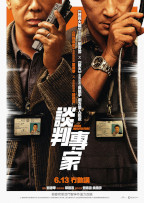
Taam pun juen ga
Hong Kong 2024
Genre:
Crime, Thriller, Action
Director:
Herman Yau
Cast:
Lau Ching-wan
Francis Ng
Michael Kiu Wai Miu
Philip Keung
Kent Cheng
Michael Chow Man-Kin
Kevin Chu Kam-Yin
Chu Pak-Him
Timmy Hung
Andy Lau

Crisis Negotiators
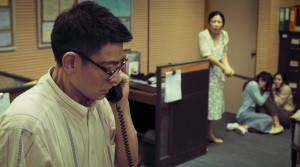
Story: Cheuk Man-Wai (Lau Ching-wan) and Tse Ka-Chun (Francis Ng) are hostage negotiators and pretty good at their jobs. On his birthday, Cheuk is visited by a colleague who tells him that certain funds from the police are being embezzled. The conspiracy goes quite deep and even the Department of Internal Affairs is involved. When the colleague wants to meet him at the harbor the next day, Cheuk only finds his dead body. Shortly afterwards, the police are on the scene. Cheuk is considered a suspect, and his apartment is searched. And there they actually find documents that link him to the murder. Cheuk is arrested and more evidence emerges, but his claims of being framed for the murder fall on deaf ears. Ultimately, he manages to escape. He goes directly to Li Chun-Kit (Michael Chow), who works in the Department of Internal Affairs and presumably blamed everything on Cheuk. He takes him and some other people there hostage, hoping to extort evidence of his innocence. However, the building is soon surrounded and Cheuk demands Tse as a hostage negotiator, although he resigned three years ago. While the police have great difficulties with the hostage-taker since he knows their procedure, Cheuk is slowly but surely running out of time, because he knows that sooner or later a special task force will storm the building ...


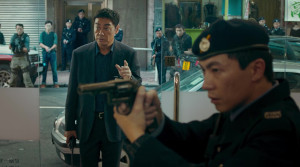

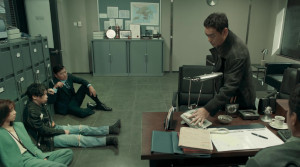
Review: If you look at today's Hong Kong cinema, most people will most likely be overcome by a longing for the 90s era of the former British crown colony. To preempt the most important thing right away: With "Crisis Negotiators" Herman Yau manages to recapture exactly that spirit. What should be a big help here is the fact that Lau Ching-Wan and Francis Ng are the same veterans as back then. In addition, the story is also set in the 90s. The reason why this is the case may not be obvious at first, but the movie is based on the action thriller "The Negotiator" with Samuel L. Jackson from 1998. At that time, not everyone had a cell phone, and you couldn't do much with the computer either. Moving the flick to the present day would have taken a lot of work, as a lot of things could be solved in different ways nowadays, and the script would have needed quite some changes. But as I said, using the 90s as a setting is actually the movie's greatest strength, especially since it is visually implemented in a believable way, both in terms of the sets and the cinematography.
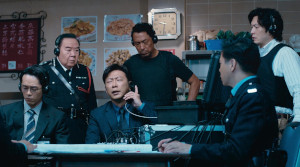
After the introduction and a drastic experience for Tse, one of the two hostage negotiators, there is another case, this time for Cheuk. It seems a bit nonsensical to have two introductions, especially since acting-wise the first one with Andy Lau ("Shock Wave 2") in a supporting role is really well-done. Nevertheless, apparently the idea behind this was to introduce both characters sufficiently and to place special emphasis on the fact that Cheuk's wife is afraid of losing her husband in a mission, so that we know there is something at stake on an emotional level too. Ultimately, this pays off, at least partially. Still, it should be noted that this makes the movie a bit too long and not every one of these scenes really seems necessary. Therefore, it takes a while until we find ourselves in the actual stalemate situation. Suddenly the police have to negotiate with Cheuk, who has taken some hostages, but he in turn knows the game all too well and is quite aware what steps the police will take next. This creates quite some innovative and interesting moments - if you don't know the original, that is ...

Sadly, the story then doesn't make that much progress for quite some time. And the level of suspense is pretty low too. Only a few scenes manage to make the heart pound a little. The plot itself doesn't offer much room for action scenes either. That's a pity, because that's where director Herman Yau's ("Moscow Mission") strength lies. Towards the finale there is a nice car chase, which qualitatively follows suit the one during Cheuk's escape, and in which the director keeps the viewer glued to the screen by the fact that cars repeatedly miss pedestrians only by a hair's breadth. Most of the time, though, Cheuk sits in an office building, and despite some attempts by the police to storm the building, including some nice explosions, Yau is not allowed to show his action skills. However, there are still the actors who are supposed to keep the whole thing going even in the somewhat slower scenes, and they actually manage to do so. First and foremost, there is Lau Ching-wan ("Detective vs. Sleuths") who comes across both sympathetic and dogged. A man about whom we are supposed to feel uncertain whether he has not already been pushed too far and could therefore eventually become a murderer to make people agree to his demands. Unfortunately, you never have any doubt that he is a good guy, though.
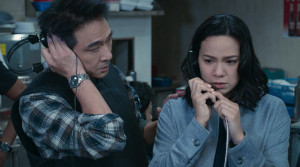
Of course, Lau Ching-Wan is already in his early 60s, and so you have to grin a few times when you see his stunt double fleeing from his colleagues like a parkour runner. Nonetheless, the movie is set in the 90s, and you can believe that he plays someone in his 40s. In this regard Francis Ng ("Death Notice") was cast a little bit more appropriately in his role, though. He is tired of police work, in which you only get involved when something has already gone wrong in someone's life. He also has little interest in conducting the negotiations and does not understand why Cheuk asked him of all people to mediate between the two parties. A few more scenes between the two protagonists wouldn't have been bad, especially since Tse also disappears into the background too often. The game between the two negotiating parties, in which both try to stay in control of the situation, is entertaining to watch, but you can't help but get the impression that more would have been possible. The mind games are a bit too superficial. This is also the reason why the level of suspense is not as high as you would have wished for.

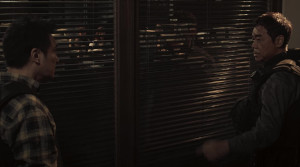
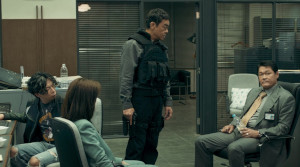

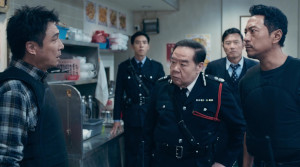
But it's just nice to have some sets and situations that clearly give out 90s charm. The fashion and hairstyles, the secretary among the hostages is just one example, also represent a beautiful journey through time. A few peculiar decisions by the director - flashbacks to scenes that took place only a few minutes earlier - spoil the fun a little bit, and you can't shake the feeling that some decisions were only made because nowadays movies have China's censorship board breathing down their neck, but even though HK cinema was more courageous back then, "Crisis Negotiators" is undoubtedly a wonderful reminder of what action thrillers used to look like. The original may be the better movie, but Herman Yau manages to deliver a little declaration of love to the 90s, and even if you don't get a nostalgic feeling just because of the actors, this is definitely a well-done thriller that will hopefully lead to similar movies.

Disclaimer










